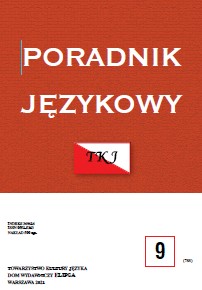FAŁSZ UJAWNIONY. O APROBATYWNYCH CZASOWNIKACH FAŁSZU
FALSEHOOD REVEALED. ON APPROVING VERBS OF FALSEHOOD
Author(s): Joanna ZauchaContributor(s): Monika Czarnecka (Translator)
Subject(s): Theoretical Linguistics, Comparative Linguistics, Western Slavic Languages
Published by: Dom Wydawniczy ELIPSA
Keywords: verbs; falsehood; approval;
Summary/Abstract: This paper is dedicated to verbs expressing approval for actions intended to reveal falshood. It considers four units: [ktoś] zadał kłam [czemuś] ([sb] proved [sth] false]), [ktoś] odkłamał [coś] ([sb] put [sth] straight]), [ktoś] zdementował [coś] ([sb] denied [sth]), and [ktoś] sprostował [coś] ([sb] corrected [sth]). Predicates one and two presuppose the falsehood of the content specified in the sentence. In the case of predicates three and four, the untruthfulness of a certain propositional content is ascertained by the rhematic part of the meaning. It is only the verb odkłamać (to put straight) that indicates that the content in question is a lie (kłamstwo). In the case of other units, falsehood can be an effect of a mistake or oversight. A characteristic feature of units two–four is also that they imply that the agent revealing the falsehood has said something. Despite the fact that the examined group of expressions is small, it sheds light on the essential mechanism of speaking. Namely, it shows the significance of the inclination of discourse as such towards truth. Eradicating falsehood from communicative interaction involves an approval for the agent’s actions that is fused into the structure of meanings of lexemes.
Journal: Poradnik Językowy
- Issue Year: 2021
- Issue No: 09
- Page Range: 74-84
- Page Count: 11
- Language: Polish
- Content File-PDF

